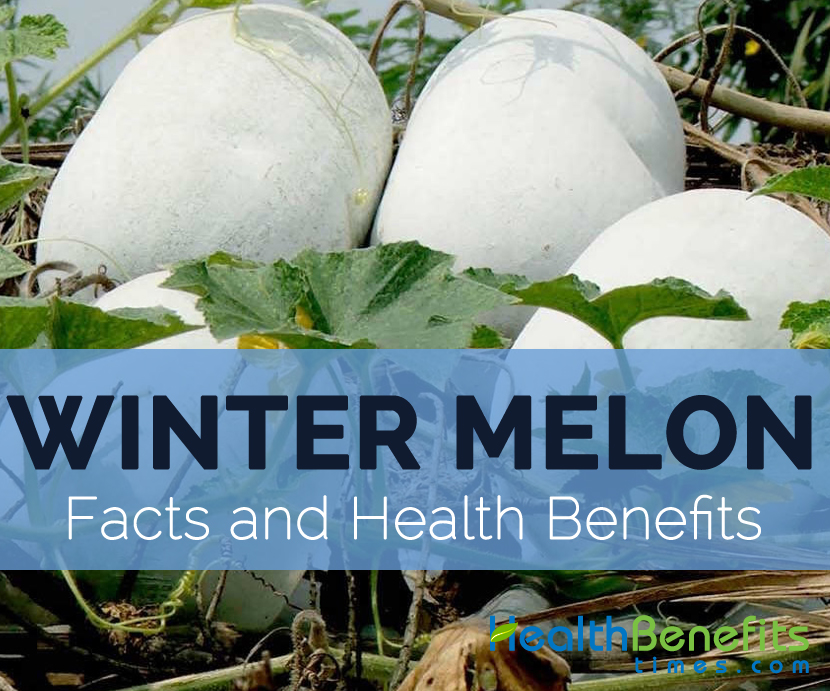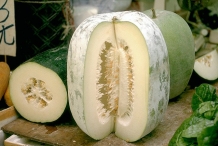Plant
Winter melon is an annual, hispid, robust and monoecious climbing plant with terete, thick, furrowed and clumsily hairy stem. The vines can grow upto 1-2 m. (3-6 ft.). The plant has rounded or kidney-shaped leaves with 5 to 7 lobed and heart-shaped at base with the diameter of leaves 10 to 25 centimeters. The flowers are large, yellow with hairy bell-shaped calyx tube. The tree bears the flowers during July – September. The plant grows in warm tropical and subtropical climate. It thrives in light, friable and well-drained soil. It has long shelf life.
Fruit
Often green in color with chalky white wax; fruits can be ovoid or ellipsoid in shape. Winter melon is about 25 – 40 cm in length and weighs upto 30 pounds. The fruit has got thin skin along with juicy and sweet interior flesh which is usually white with flat, ovate – elliptic, ridged and yellowish brown seeds. The fruit possess mild aroma which is not prominent. Winter melon is found during cold season.
Nutritional value:
Winter melon is loaded with nutrition. It contains Vitamin B1, Vitamin B3 and Vitamin C. It also possess various minerals such as calcium, sodium, zinc, iron, phosphorus, manganese, copper, magnesium, selenium and potassium. Due to its high content in potassium, it helps to maintain blood pressure level. It contains nearly 96% water. One should add this vegetable to the weight loss diet.
Health Benefits of Winter melon
Winter melon is used as a part in traditional Chinese medicine. It acts as a diuretic which reduce the swelling. It is helpful for treating kidney weakness and hypertension. It works as a great for losing weight. It is also effective to treat snakebites and mercury poisoning. Winter melon is a good source of amino acids, natural sugars, minerals, organic acids and vitamins.
- Eliminates free radicals
Vitamin C is an antioxidant which prevents the damage caused by free radicals, pollutants and toxic elements. Free radicals are formed in the body when the food is break down or when exposed to the tobacco, smoke or radiation. The buildup of free radicals contributes to the health ailments such as heart disease, cancer and arthritis.
2. Prevents flu and cold
Vitamin C promotes the immunity function of the body which prevents from the viruses of cold and flu. The evidence shows that the presence of Vitamin C in the Winter melon reduces the chances of lung infections and pneumonia.
- Reduce the chances of stroke
The study of American Journal of Clinical Nutrition shows that the people who intake adequate amount of Vitamin C, their chances of stroke was reduced by 42%. Winter melon possesses Vitamin C by 19.11% which helps to reduce the risk of stroke.
4. Prevents migraines
Vitamin B2 deals the headaches caused by migraines. It is shown that the frequency of migraines, pain and symptoms is reduced with the intake of Vitamin B2 which is also found in Winter melon. It also shortens the duration of migraine headaches.
- Eye health
The studies show that the eye problems are related to the deficiency of riboflavin. Vitamin B2 forbids the eye ailments such as keratoconus, cataracts and glaucoma. The research shows the correlation between the consumption of riboflavin and reduces in the eye disorders.
- Maintains energy levels
Vitamin B2 is required for proper functioning of nerve, brain, digestive and hormones. The absence of Vitamin B2 leads to the improper digestion of protein, fat and carbohydrate foods. So, it is essential for the repair and growth of body. It converts the nutrients into the energy which provides the healthy metabolism.
Riboflavin also maintains the proper activity of thyroid and adrenal. The deficiency of riboflavin increases the chances of thyroid ailments. It also calms the nervous system, chronic stress and regulates the hormones.
- Digestive health
The dietary fiber in Winter melon enhances the digestive function. It allows the stool and bulk to pass through the digestive system. It forbids the digestive diseases such as colon cancer, diverticulitis and inflammatory bowel.
- Heart health
Soluble fiber lowers the absorption of cholesterols and fat in the body. It eliminates the bile which is made from the cholesterol. Therefore, it reduces the overall cholesterol stores from the body.
- Maintains the cognitive function
Iron helps to transport the oxygen to the brain which supports the brain function. The fact is that brain uses the 20% of the oxygen in the body. The deficiency of iron results in the mental problems and harms the memory. The deficiency of iron may cause the learning difficulties in the infants and children.
Traditional uses
All the parts of the plant are useful for the medicinal purposes. The Ayurvedic system of medicine uses it in Kusmanda lehyam to treat the nervous disorders and epilepsy. Ayurveda uses Winter Melon to cure peptic ulcers. In India, it is used to treat the health ailments such as gastrointestinal problems, dyspepsia, and asthma, burning sensation, heart diseases, cough, ulcers, diabetes mellitus, urinary diseases and gastrointestinal problems. In Sri Lanka, it is also used to antidote the vegetable poisons and also treats hiccough, asthma, insanity, cholera, anthelmintic, delicacies, cough and diabetes. The people of Korea use it to treat diuresis diseases and diabetic compilations. Winter melon is used in China for skin softening and moisturizing, to treat facial blemishes, anti-aging skin and anti-wrinkle properties, and also to prevent sun damage. The traditional Chinese medicine uses it for curing inflammation and hypertension. The people of China use the peel for the thirst and oliguria, oedema with oliguria caused from summer heat. It could also be used for tonic, diuretic, laxative and cooling purposes. The Philippines uses it for treating tuberculosis and for demulcent, astringent and styptic purposes. The seeds are also used in the form of vermifuge.
How to Eat
Winter melon could be added to the stir-fries by steaming, simmering, parboiled or braised. It is also added with strong herbs and spices to the soups. It could be candied or diced.
Precautions
Winter melon should be consumed in lower amount as it may result in indigestion due to the presence of high proteins. Mint leaves, jeera, cloves, dry ginger could be used as an antidote for the side effects of Winter melon. The consumption of Winter melon should be avoided by the pregnant women during the initial months.
Comments
comments
| Winter melon Quick Facts | |
|---|---|
| Name: | Winter melon |
| Scientific Name: | Benincasa hispida |
| Origin | South Asia and Southeast Asia, now is widely cultivated throughout Asia, the Americas, Europe and Australia. |
| Colors | Green with white wax |
| Shapes | Ovoid or ellipsoid, Length: 25 - 40 cm |
| Flesh colors | White |
| Taste | Sweet |
| Calories | 17 Kcal./cup |
| Major nutrients | Dietary Fiber (10.00%) Sodium (9.80%) Zinc (7.36%) Iron (6.63%) Vitamin B1 (4.42%) Phosphorus (3.57%) |
| Health benefits | Prevents migraines, Eye health, Digestive health, Heart health and Reduce stroke |
| More facts about Winter melon | |



